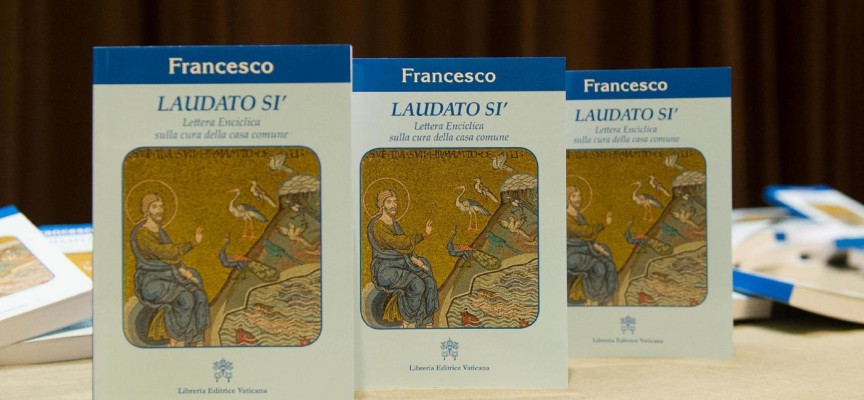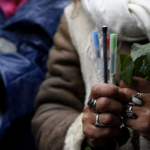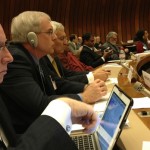Pope Francis addressed his encyclical letter Laudato si’ on care for our human home to every person living on the planet. It has received an overwhelming echo all over the world. Most of the reactions have been positive. Indeed the Holy Father has expressed the single issue for our times that most concerns humanity. Pope Francis has not only spoken to all but he spoke on behalf of all of us. He has done so very modestly by taking into account the teaching of his predecessors, of fellow bishops and other religious leaders, by accepting the insights of modern science and by refusing to offer political remedies and technical fixes. After reading this long and beautiful letter I would like to share a few comments from a European perspective as President of Justice and Peace Europe.
Laudato si’ forcefully insists that debates on the environment must integrate questions of justice. Pope Francis tells us “a true ecological approach always becomes a social approach”(N°49). A valid response to the ecological crisis can only arise if the common good is pursued from the perspective of the excluded. Assuming this perspective in Europe is not as simple as in other parts of the world, as Europe is the richest region of the world. Therefore Justice and Peace Europe, as part of the wider Justice and Peace movement of the Catholic Church, feels encouraged by the encyclical letter to continue its mission to promote social justice in Europe and to do so especially in the context of the European organisations and their institutions.
Laudato si’ has reminded us with great clarity that the depletion of some natural resources, water in particular, creates a serious risk for peace. New forms of war and armed conflict have come upon us. The Organisation for Security and Cooperation in Europe (OSCE), the Council of Europe and the European Union (EU) – the latter being on the brink of redrafting its outdated Security Strategy – should fully take into account the growing risk of environmental wars. Justice and Peace Europe together with its numerous partners will support efforts to prevent such conflicts.
Laudato si’ leaves no doubt that climate change is mainly the result of human activities. Stopping climate change requires a change of life style in the richer regions of the world, including Europe.The Pope’s letter is a generous invitation to reduce our energy consumption, change our transport modes and move towards a circular economy. It is a friendly call to Europeans to discover other forms of well-being. It is also – at the political level – an encouragement to fully accept the idea of differentiated responsibilities (N°52). Some poorer countries especially will need substantial help to adapt to the consequences of climate change. Justice and Peace Europe therefore asks the European Union and its member states to offer additional funding for the UN’s green climate fund, which should provide $100 billion a year by 2020 for the most affected and deprived regions in the world. Credible funding for climate adaptation is a key to success for the forthcoming climate summit in Paris.
Laudato si’ teaches us that there is no solution to the current ecological crisis without a global consensus. “Everything in the world is connected”, writes the Holy Father. Therefore the isolated action of a single nation is laudable and often useful in order to make a first step but it is not sufficient. Because of the transnational character of the economy, and especially the financial sector, the power of nation-states is further diminishing in the 21th century. For Justice and Peace Europe the European Union remains – despite indisputable shortcomings – an appropriate response to these “Rerum novarum”, to this revolutionary change. Based on the rule of law it may inspire new forms of global governance on ecological matters and lead “to planning a sustainable and diversified agriculture, developing renewable and less polluting forms of energy, encouraging a more efficient use of energy, promoting a better management of marine and forest resources, and ensuring universal access to drinking water” (N°164).
Laudato si’ is a forceful argument for better safeguarding and protecting God’s creation. The loss of bio-diversity is a global phenomenon because of “short-sighted approaches to the economy, commerce and production” (N° 32). It also affects Europe. In its recent report, the State of nature in the EU, the European Environment Agency has stressed the success of the EU Species Action Plan yet assesses that the outlook is favourable for only 16% of habitats and 23% of species. Thus, Justice and Peace Europe supports efforts to reinforce conservation measures.
Finally, Laudato si’, reminds humanity of the need to renew itself. Without respect for the dignity of every human person, “the worth of a poor person, a human embryo, a person with disabilities – to offer just a few examples – it becomes difficult to hear the cry of nature itself” (N°117). The Holy Father has stressed the connection between an adequate vision of the human being – an authentic anthropology – and the challenge to get the ecological question right. Justice and Peace Europe will contribute towards promoting this renewal in its dialogue with the European Union.
Papa Francesco ha indirizzato la sua lettera enciclica Laudato si’ sulla cura della nostra casa umana a ogni persona che vive sul nostro pianeta. Ha ricevuto un’enorme eco in tutto il mondo. La maggior parte delle reazioni sono state positive. Infatti il Santo Padre ha espresso l’unico problema del nostro tempo che riguarda la maggior parte dell’umanità. Papa Francesco non solo ha parlato a tutti, ma ha parlato a nome di tutti noi. Lo ha fatto molto modestamente tenendo conto dell’insegnamento dei suoi predecessori, dei vescovi e degli altri leader religiosi, accettando le intuizioni della scienza moderna e rifiutando di offrire rimedi politici e correzioni tecniche. Dopo aver letto questa lunga e bellissima lettera vorrei condividere alcune osservazioni da una prospettiva europea in qualità di Presidente di Giustizia e Pace Europa.
Laudato si’ insiste con forza sul fatto che i dibattiti in materia di ambiente devono integrarsi con le questioni di giustizia. Papa Francesco ci dice che “un vero e proprio approccio ecologico diviene sempre un approccio sociale” (n. 49). Una valida risposta alla crisi ecologica può emergere solo se il bene comune è perseguito dal punto di vista degli esclusi. Assumere questa prospettiva in Europa non è semplice come in altre parti del mondo, dato che l’Europa è la regione più ricca del mondo. Pertanto Giustizia e Pace Europa, come parte del più ampio movimento di Giustizia e Pace della Chiesa cattolica, si sente incoraggiata dalla lettera enciclica a continuare la sua missione di promozione della giustizia sociale in Europa e farlo soprattutto nel contesto delle organizzazioni europee e delle loro istituzioni.
Laudato si’ ci ha ricordato con grande chiarezza che l’esaurimento di alcune risorse naturali, l’acqua in particolare, crea un serio rischio per la pace. Nuove forme di guerra e di conflitto armato sono emerse. L’Organizzazione per la sicurezza e la cooperazione in Europa (OSCE), il Consiglio d’Europa e l’Unione europea (UE) – quest’ultimo sta per riformulare la sua obsoleta strategia di sicurezza – dovrebbero prendere pienamente in considerazione il crescente rischio di guerre ambientali. Giustizia e Pace Europa insieme con i suoi numerosi partner sosterrà gli sforzi per prevenire tali conflitti.
Laudato si’ non lascia dubbi sul fatto che il cambiamento climatico è principalmente il risultato delle attività umane. Fermare il cambiamento climatico richiede un cambiamento dello stile di vita nelle regioni più ricche del mondo, Europa inclusa. La lettera del Papa è un generoso invito a ridurre il nostro consumo di energia, a cambiare le nostre modalità di trasporto e a muoverci verso un’economia circolare. Si tratta di un invito amichevole agli europei a scoprire altre forme di benessere. È anche – a livello politico – un incoraggiamento ad accettare pienamente l’idea di responsabilità differenziate (n. 52). Alcuni paesi più poveri in particolare avranno bisogno di un aiuto sostanziale per adattarsi alle conseguenze dei cambiamenti climatici. Giustizia e Pace Europa chiede pertanto all’Unione europea e ai suoi Stati membri di offrire finanziamenti supplementari al fondo per un clima verde delle Nazioni Unite, che dovrebbe fornire 100 miliardi di dollari all’anno entro il 2020 per le regioni più colpite e più povere nel mondo. Un finanziamento credibile per l’adattamento climatico è una chiave per il successo del prossimo vertice sul clima a Parigi.
Laudato si’ c’insegna che non esiste una soluzione per l’attuale crisi ecologica senza un consenso globale. “Tutto nel mondo è collegato”, scrive il Santo Padre. Pertanto l’azione isolata di una singola nazione è lodevole e spesso utile per fare un primo passo, ma non è sufficiente. A causa del carattere transnazionale dell’economia, in particolare nel settore finanziario, il potere degli stati-nazione diminuirà ulteriormente nel 21° secolo. Per Giustizia e Pace l’Unione europea resta – nonostante le carenze indiscutibili – una risposta adeguata a queste “Rerum novarum”, a questo cambiamento rivoluzionario. Sulla base dello stato di diritto, può ispirare nuove forme di governance globale sulle questioni ecologiche e condurre “a pianificare un’agricoltura sostenibile e diversificata, sviluppando forme di energia rinnovabili e meno inquinanti, favorendo un uso più efficiente dell’energia, promuovendo una migliore gestione delle risorse marine e forestali, e garantendo l’accesso universale all’acqua potabile” (n. 164).
Laudato si’ è un argomento forte per una migliore salvaguardia e tutela della creazione di Dio. La perdita di biodiversità è un fenomeno globale a causa di “approcci miopi all’economia, al commercio e alla produzione” (n. 32). Questo tocca anche l’Europa. Nella sua recente relazione, lo Stato della natura nell’UE, l’Agenzia europea dell’ambiente ha sottolineato il successo del piano d’azione UE sulle specie, tuttavia valuta che le prospettive siano favorevoli solo per il 16% degli habitat e il 23% delle specie. Così, Giustizia e pace Europa sostiene gli sforzi per rafforzare le misure di conservazione.
Infine, Laudato si’ ricorda all’umanità la necessità di rinnovarsi. Senza il rispetto per la dignità di ogni persona umana, “il valore di un povero, di un embrione umano, di una persona con disabilità – solo per offrire alcuni esempi – diventa difficile sentire il grido della natura stessa” (n. 117). Il Santo Padre ha sottolineato la connessione tra una visione adeguata dell’uomo – un’antropologia autentica – e la sfida per affrontare correttamente la questione ecologica. Giustizia e Pace Europa contribuirà a promuovere questo rinnovamento nel suo dialogo con l’Unione europea.
Msgr. Jean-Claude Hollerich
Latest posts by Msgr. Jean-Claude Hollerich (see all)
- Laudato si’: it also affects Europe - 7 luglio 2015
- “They are worthy to be accepted” - 17 giugno 2015











